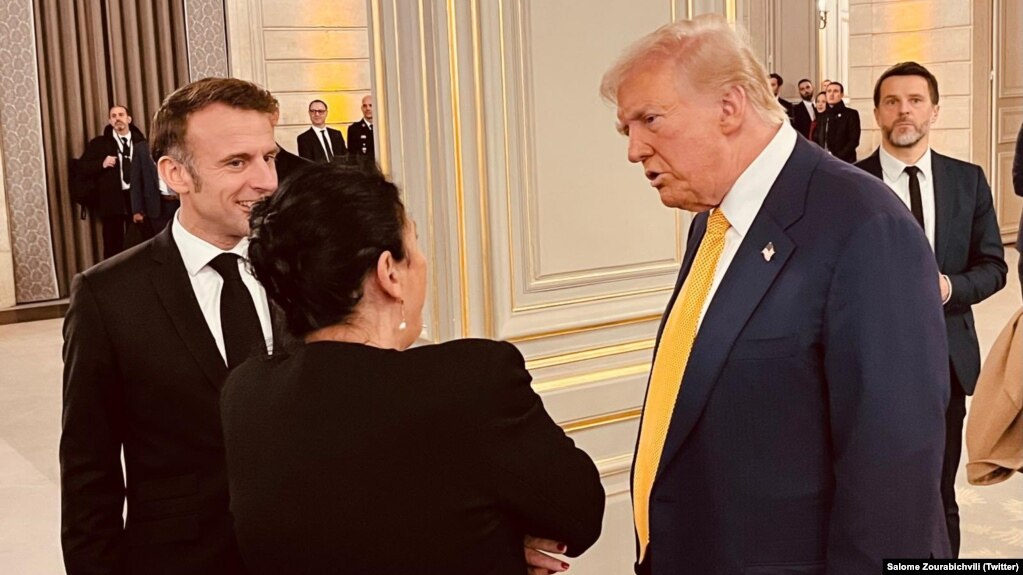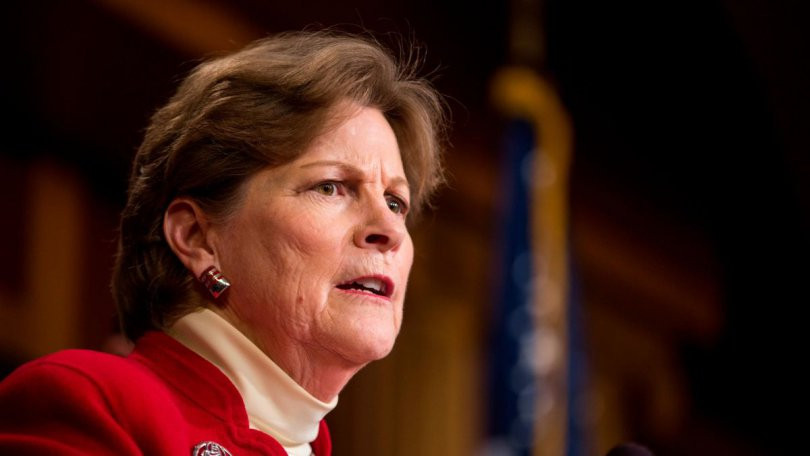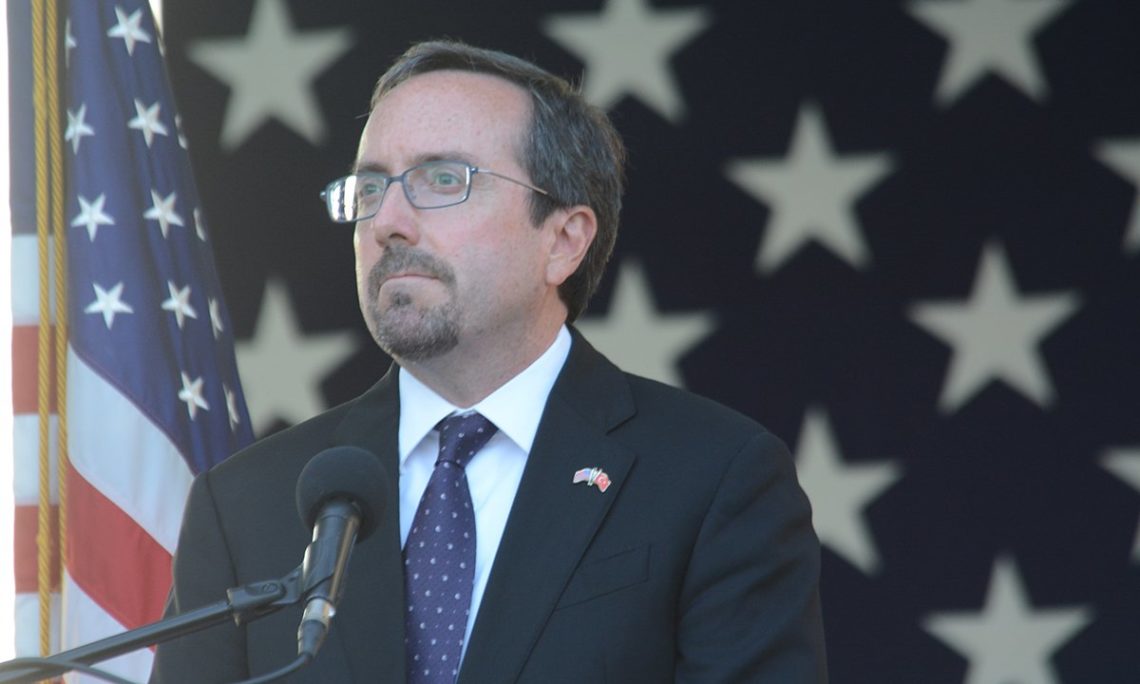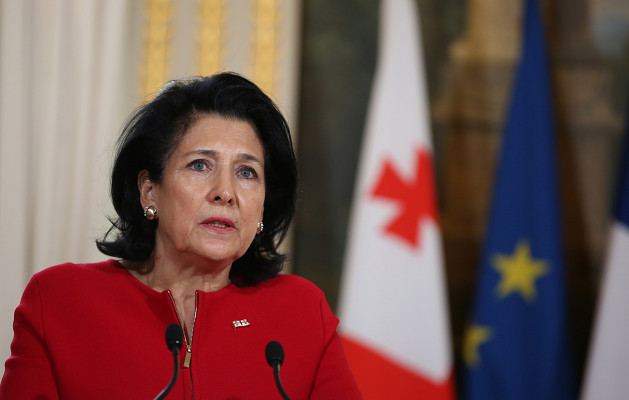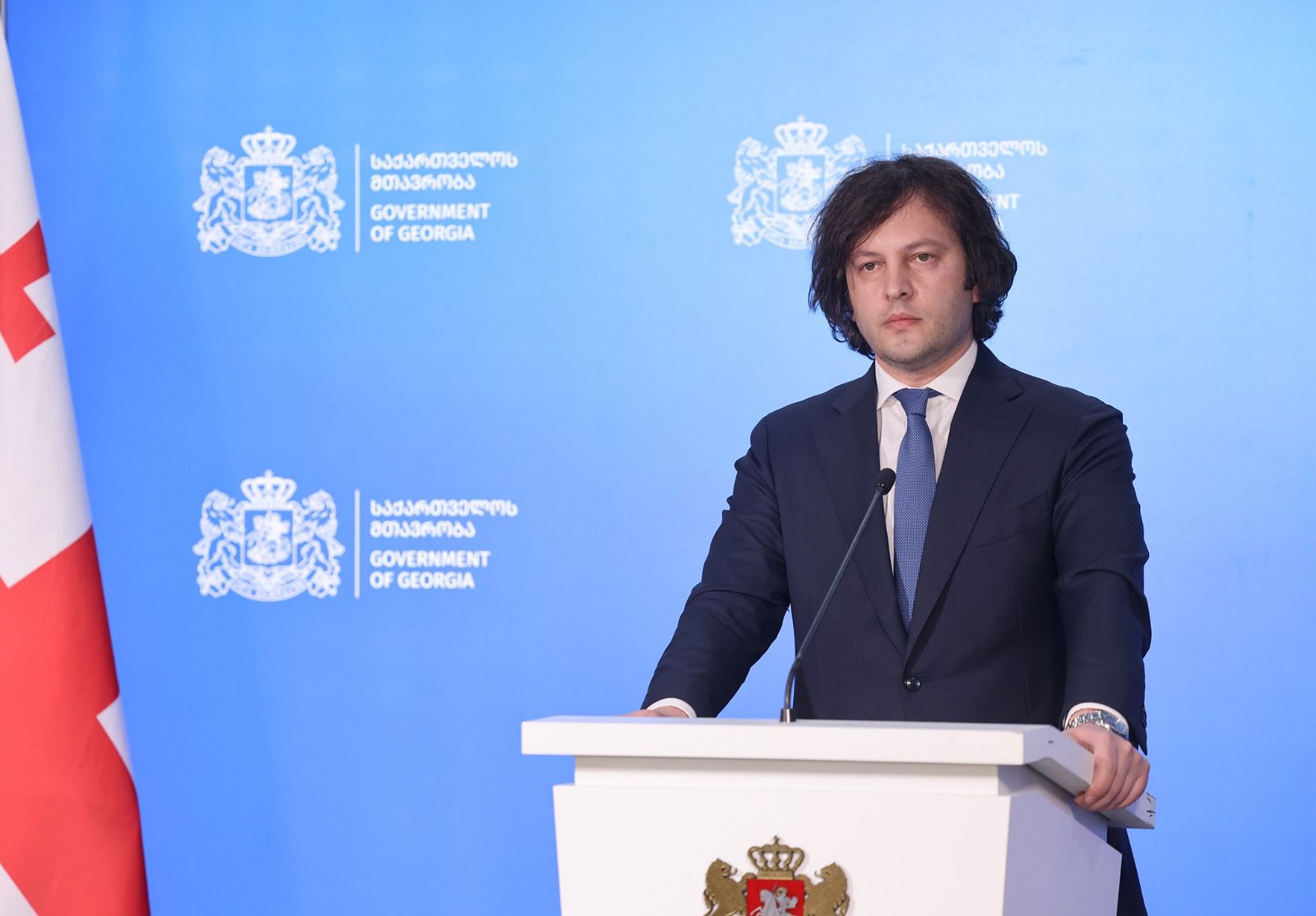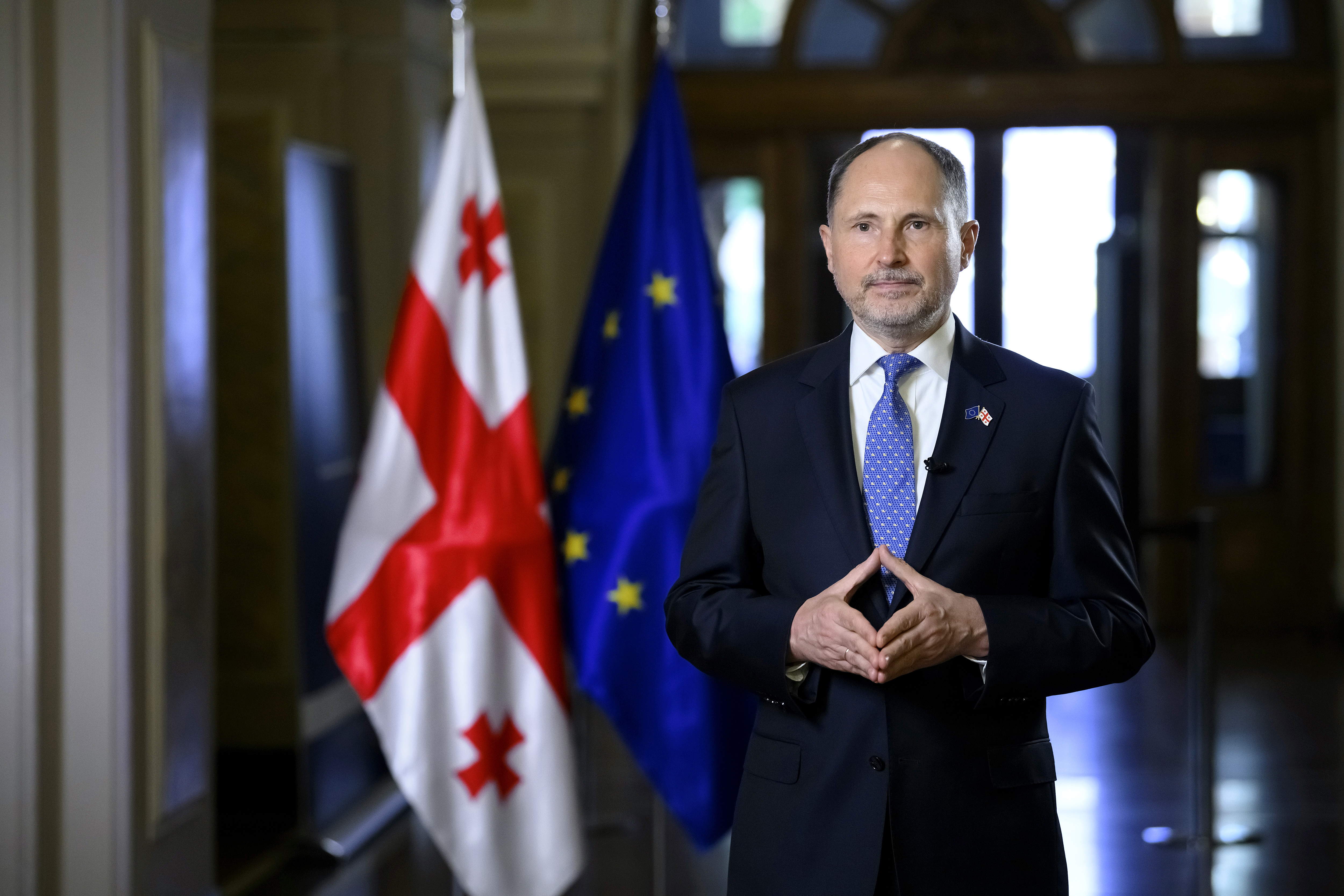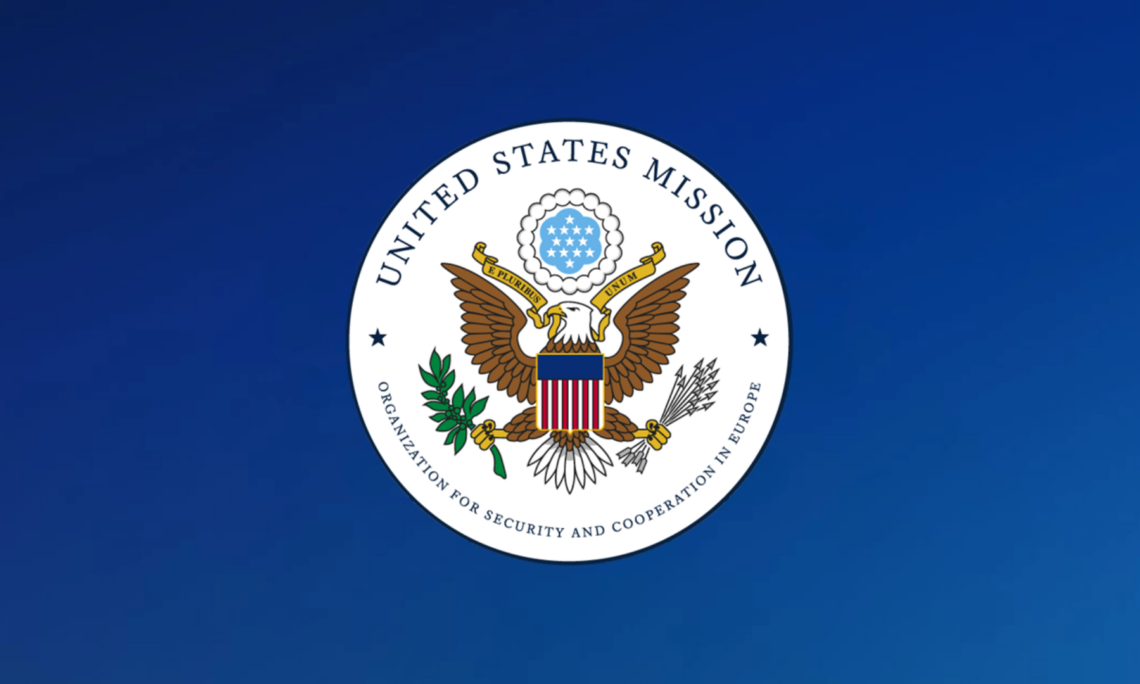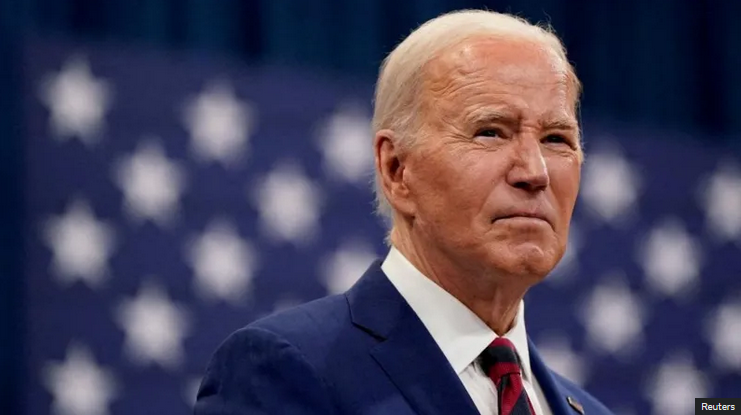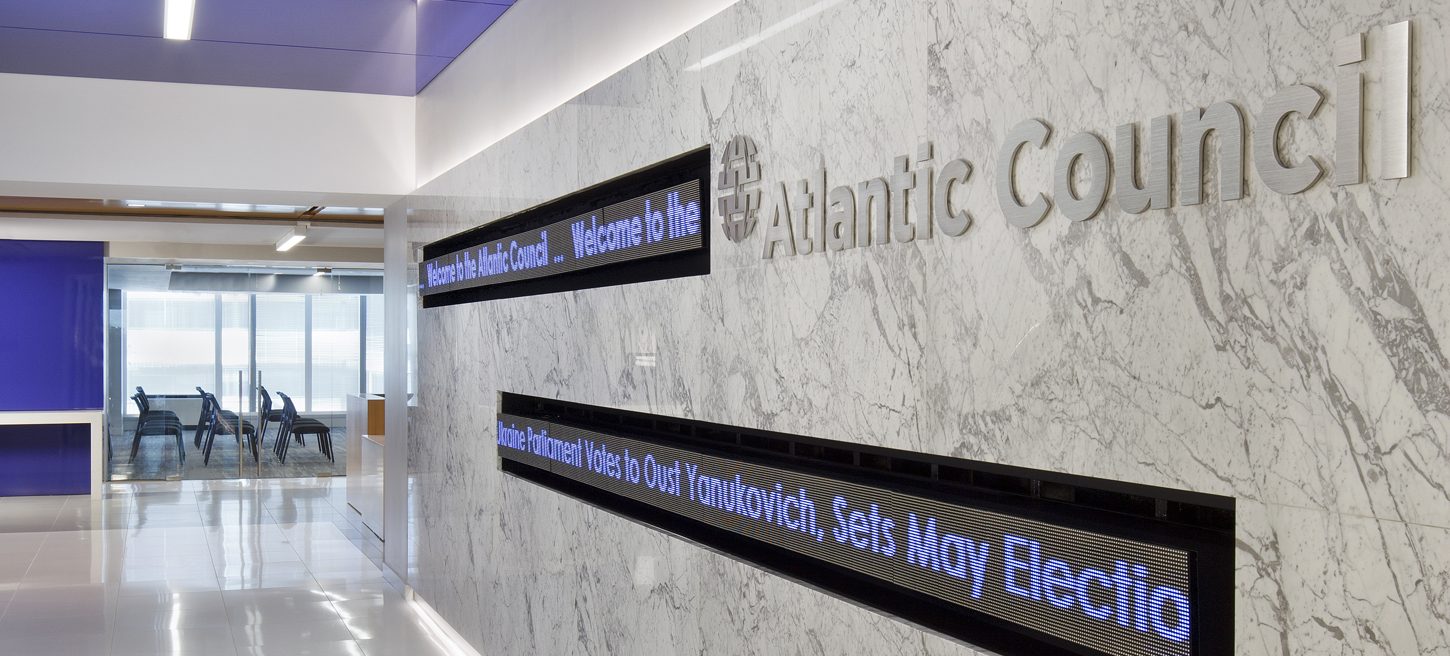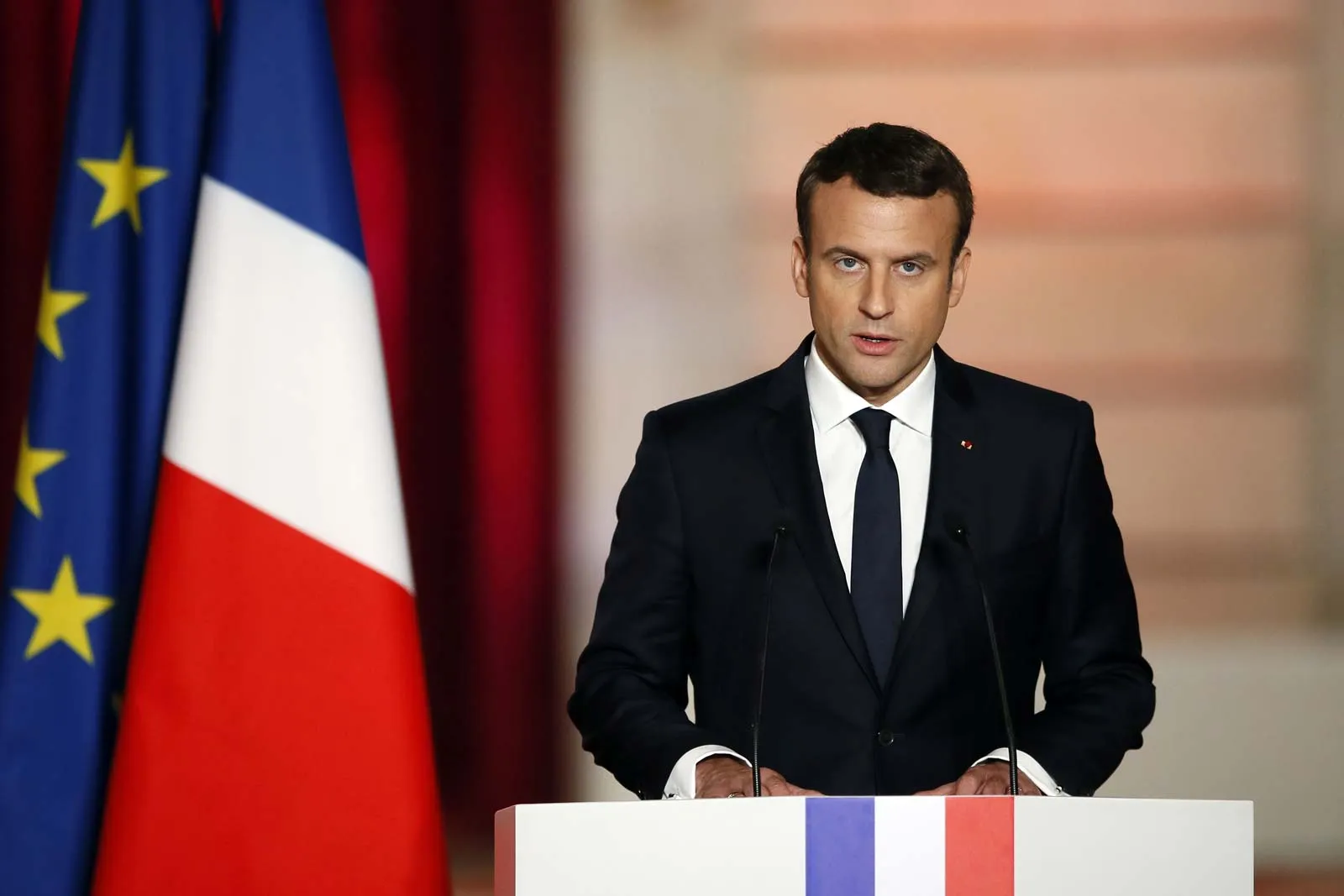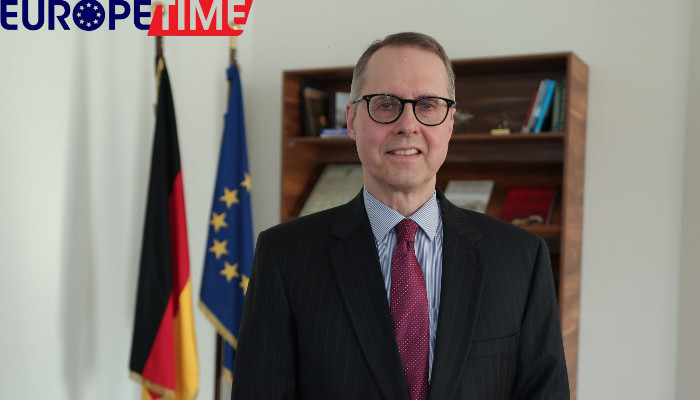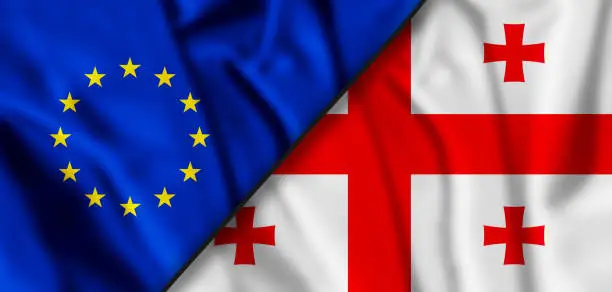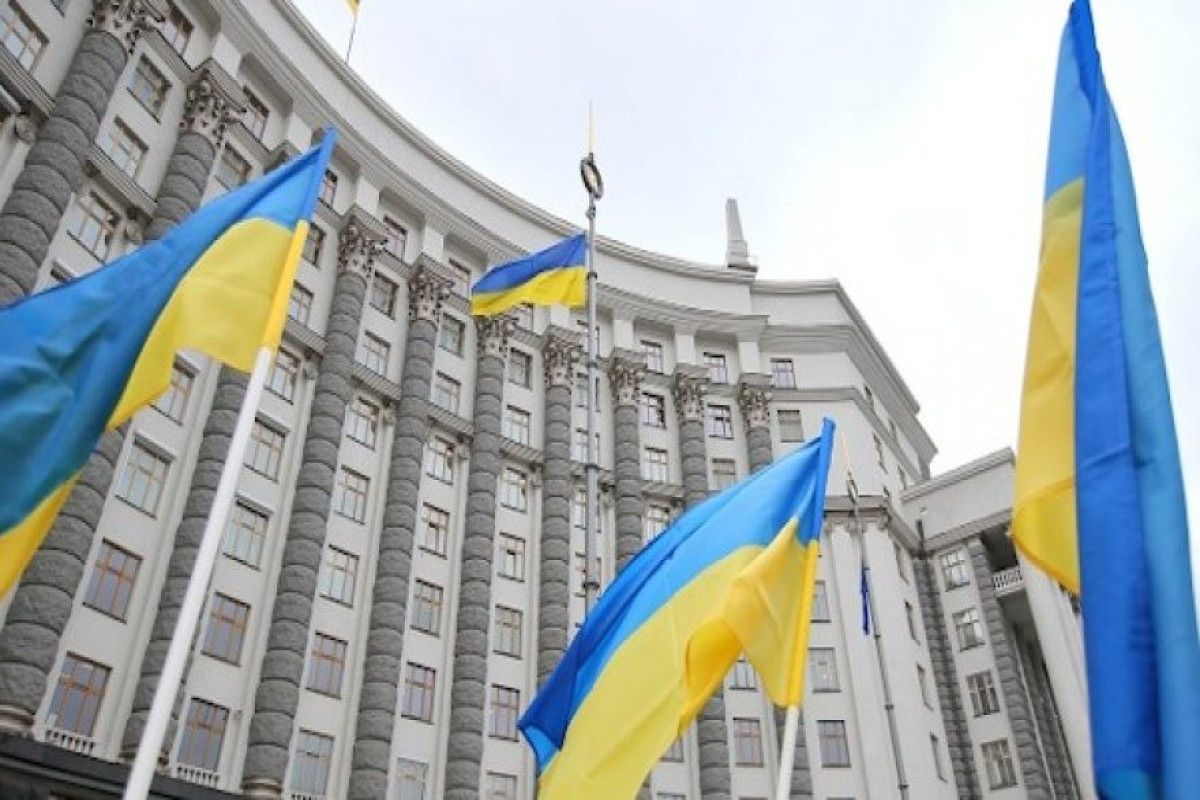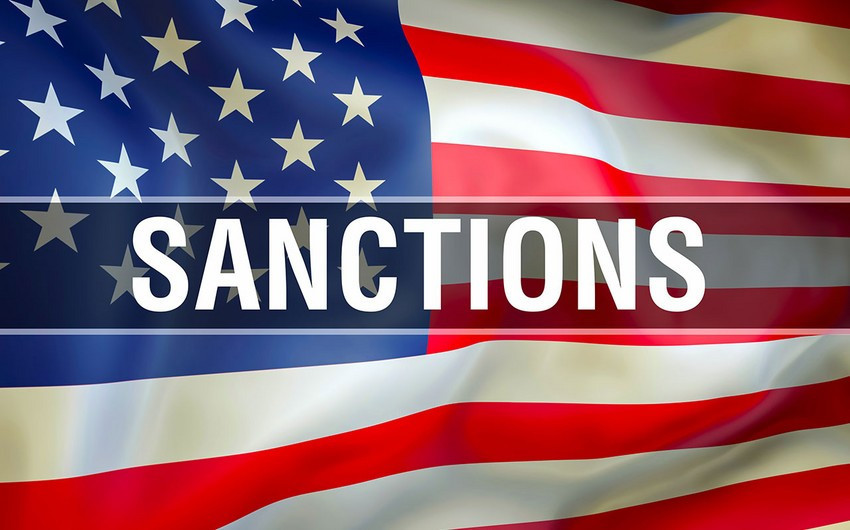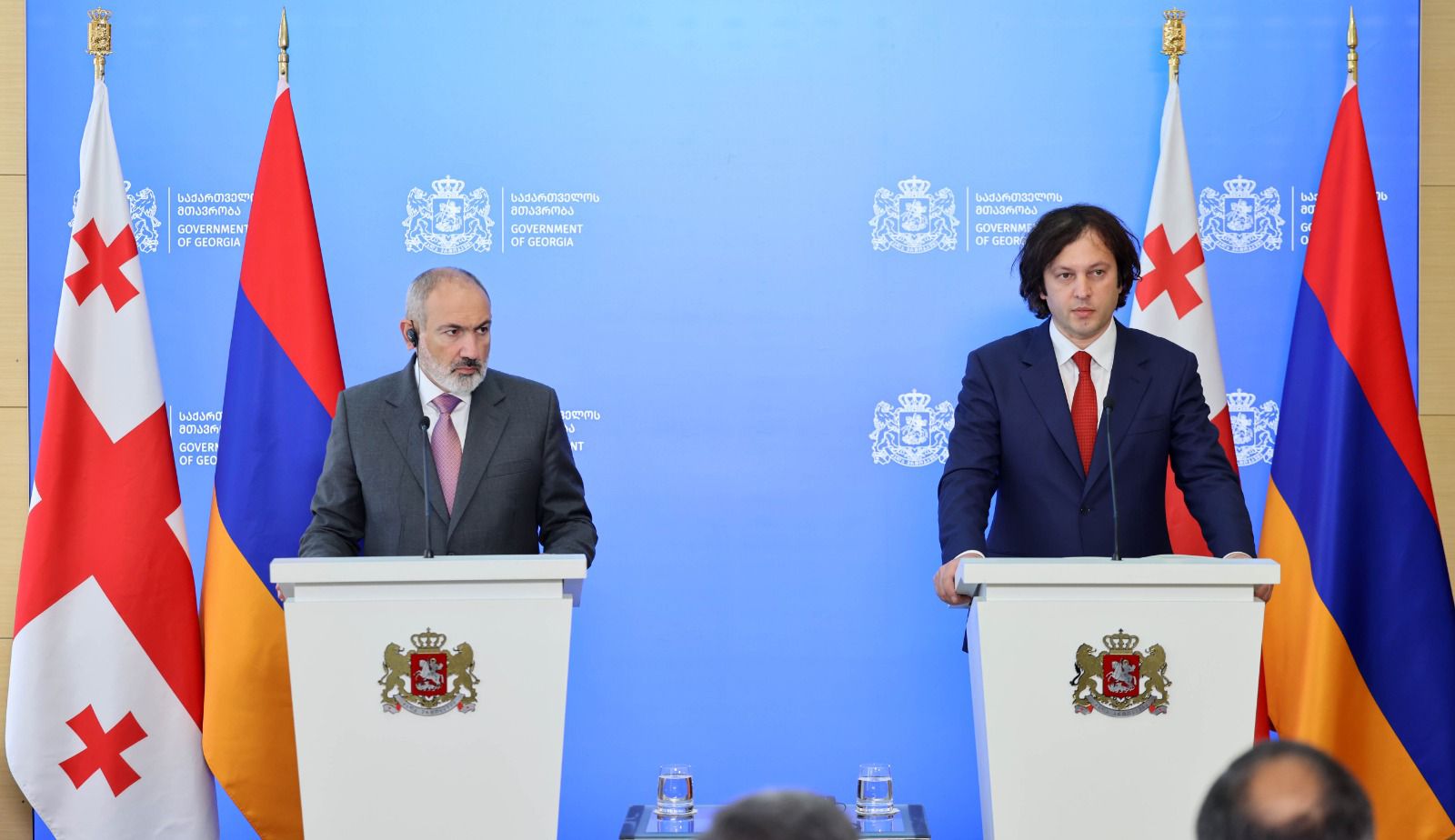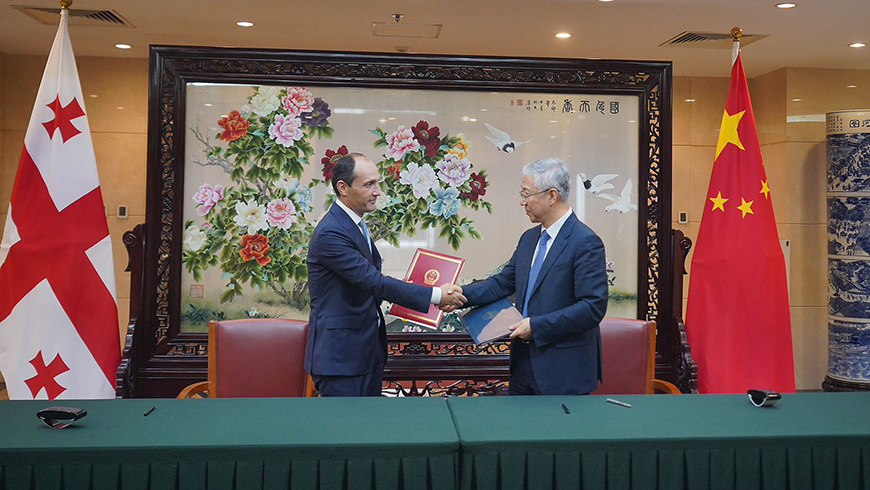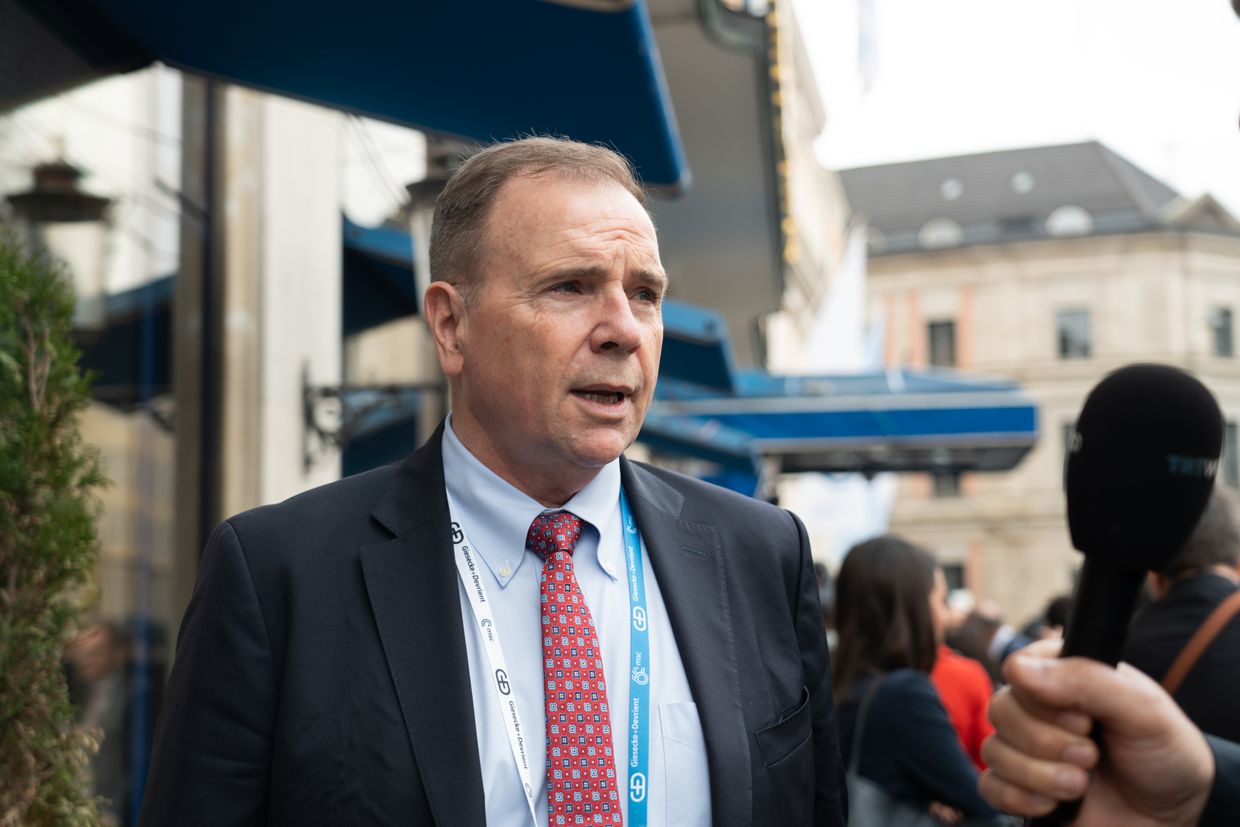Politics
Zurabishvili discusses the ongoing developments with the US President-elect Donald Trump
Georgian President Salome Zurabishvili is in Paris, France, for the opening of the restored Notre Dame cathedral, an event attended by many world leaders, including the President-elect Donald Trump. On December 7 President Zurabishvili met with the President of Ukraine, Volodymyr Zelenskyy. She also released information about meetings with the President of France Emmanuel Macron, US President-elect Donald Trump, Italian Prime Minister Giorgia Meloni, and Polish President Andrzej Duda. The visit of the Georgian President to Paris took place amidst the massive popular protests in Georgia against the Georgian Dream government decision to postpone accession negotiations process with EU. Ukrainian President wrote: “I expressed Ukraine’s full support and solidarity with the Georgian people, who are fighting for their dignified future, and emphasized that respecting the will of the Georgian people and preventing Ivanishvili’s government from surrendering the country to Putin is essential for the stability and future of the region.” He further noted that for Russia, this is not just about Georgia adding that “it is about control of the Black Sea region – a strategic Russian goal that poses a threat to the national security of everyone in the region and across Europe.” President Zelenskyy assured President Zurabishvili that “Ukraine will coordinate with partners, not just in Europe but globally, to deliver a systemic response and support the Georgian people in defending their right to live freely and independently.” While on a visit in Paris, Salome Zurabishvili had opportunity to discuss the ongoing developments with the US President-elect Donald Trump. Georgian President said she had an in-depth discussion with President Trump and President Macron. She stated: “I exposed the stolen elections and the extremely alarming repression against the Georgian people. I emphasized the need for a strong United States. The Georgian people have a friend in Donald Trump. God bless the United States of America.” President Zurabishvili wrote she had an excellent discussion with Italian Prime Minister Giorgia Meloni and discussed with her “the alarming repression undergoing in Georgia.” Following the meeting with Polish President Andrzej Duda, Salome Zurabishvili thanked the Polish President for standing with Georgia “personally and on behalf of the Polish nation at all times, especially during these dark hours of repression and terror. We trust and believe that Georgians with Poland’s support, will prevail and our shared European future will unite us!” the President said on X.
UK Halts Aid and limits engagement with Georgian Government
The UK Foreign Secretary David Lammy has announced the suspension of all program support to the Georgian government, as well as restrictions on defense cooperation and engagement with the Georgian government in response to the recent crackdown on protests in Georgia. In an issued statement, Lammy condemned the “shocking scenes of violence towards protestors and journalists” by Georgian authorities, saying the actions are “unacceptable and must stop.” “The shocking scenes of violence towards protestors and journalists by the Georgian authorities are unacceptable and must stop. These actions tarnish Georgia’s international standing and fly in the face of Georgia’s constitutional commitment to a European future. In light of ongoing events, the UK will immediately suspend all programme support to the Georgian government, restrict defence cooperation, and limit engagement with representatives of Georgian Dream government until there is a halt to this move away from European democratic norms and freedoms. The UK will continue to stand by the people of Georgia in supporting their right to choose their country’s future,” the Foreign Secretary stated. Amid ongoing pro-EU protests in Georgia, sparked by the Georgian Dream government’s decision to postpone EU accession until 2028, several international developments have occurred. On November 28, after the October 26 elections, Sweden’s Minister for International Development Cooperation and Foreign Trade, Benjamin Dousa, announced that the Swedish government would halt direct cooperation with the Georgian government. Subsequently, on November 30, U.S. State Department Spokesperson Matthew Miller stated that the United States had suspended its strategic partnership with Georgia due to the Georgian Dream government’s decision to delay EU accession. Additionally, Germany’s Federal Minister for Economic Cooperation and Development, Svenja Schulze, announced that no new development cooperation projects with Georgia would be approved or commissioned, and no loan agreements would be signed. These measures reflect growing international concerns over Georgia’s move away from the European path.
Georgia discussed at the US Senate’s Foreign Relations Committee hearing on the implementation of the Magnitsky Act
On December 5 the US Senate Foreign Relations Committee held a hearing on the implementation of the Global Magnitsky laws, to discuss ways to further strengthen and improve the implementation of the sanctions tool and to better coordinate with other countries. Discussions, among other issues, focused on Georgia and the continuing human rights abuses of demonstrators by the Georgian government, with a hope expressed that Magnitsky sanctions would be helpful in addressing the human rights abuses of the Georgian people by the ruling authorities. The two witnesses heard at the Committee hearing were Adam Kieth, Senior Director of Human Rights First, and William Browder, Chief Executive Officer of Hermitage Capital Management, one of the initiators of the Magnitsky Act, a sanctions tool designed to impose global individual sanctions for human rights abuses and corruption. During the deliberations, the Ranking Member Senator James Risch noted that: “In the past weeks the Georgian government has brutally cracked down on pro-EU demonstrations. We have to consider how we can use tools at our disposal to defend basic rights and preserve the environment where people can freely and fairly decide their future.” He referred to the telephone call the same morning between the Committee members and the President of Georgia Salome Zurabishvili, which he said was “enlightening.” Chairman Senator Ben Cardin further added: “We hope the Magnitsky sanctions will be helpful to get Georgia to the right path”, adding the actions of the “current authorities” towards the population of Georgia are “unacceptable.” Senator Jeanne Shaheen said that “the situation in Georgia is getting increasingly dire. We’ve had on this committee a long-standing commitment to the Georgian people, I think we are all watching with great concern the deteriorating situation that we are seeing, with thousands of people in the streets to protest the Georgian Dream’s decision to suspend EU accession talks.” She asked witnesses a question about the link between corruption and human rights abuses, and “what role the corruption played in fueling a crisis in Georgia?” Bill Browder, one of the witnesses, said that “corruption is a crucial issue”. He stressed that Bidzina Ivanisvili, an oligarchic billionaire and informal ruler in Georgia, made his money in Russia through GASPROM and other state companies, which he said were “highly corrupt”. He said that Ivanisvhili then went back to Georiga. “So, how do Russians control him? They say: you made your money in ways that are potentially dubious, we can take it all away from you, open criminal cases, or we may do none of that, if you help us. So he’s been actively helping them ever since,” Boll Brodwer noted. He said: “So, it would be fair to say that the current illegitimate Georgian government is a Russian puppet government and Bidzina Ivanishvili plays a very active role in this situation.” He further added that the other side of the story is that “people who are corrupt and are in power, they don’t want the next government to investigate them” adding that they refuse to relinquish power and rig elections. “That’s the role corruption plays,” concluded the US Senator. Commenting on the general challenge to sanctions, particularly those imposed on Russia, which lies in the effective ways to avoid them he noted that Russians have found every way around sanctions, noting that „the Georgians, they are soft on it, so all the staff that’s not supposed to go to Russia is all coming in through Georgia. We know that there is a supply line coming in that way, there are a lot of leaks.” Senator Jeanne Shaheen said: “It’s important for us to send a message that there is a bilateral consensus in Senate and Congress on this issue regarding Georgia and we are not going to tolerate [this situation] without taking action against this gross abuse that’s taking place in the country.” Shaheen and U.S. Senator Jim Risch (R-ID), Ranking Member of the U.S. Senate Foreign Relations Committee, issued a statement Sunday expressing concern about the violence unfolding in the aftermath of the Georgian government’s decision to suspend EU accession negotiations and called on the State Department to impose sanctions on individuals responsible for undermining Georgia and committing violence against peaceful protestors.
Georgia will become a NATO member, when allies assess that it is prepared to fulfill the obligations that come with membership, John Bass says
Ambassador John Bass, Under Secretary of State for Political Affairs, answered the question by Europetime. Q - „At the NATO summit held in Bucharest in 2008, allies decided that Georgia would join NATO. The decision was reaffirmed at the subsequent summits. During your tenure as U.S. ambassador to Georgia, we have repeatedly heard your comments regarding the integration of Georgia into NATO. How do your earlier assumptions and expectations align with the present dynamics and process of the country’s integration into the Alliance?” A - „I would first say that for many of us who spent time in Georgia or working with Georgians, particularly in the aftermath of the conflict in 2008 in which, yet again, Russia was attempting to determine how a neighboring country should live, dictate whether or not that country should be free to choose its own security relationships with, in this case, NATO – having been there in that period, it’s been very disturbing to see the evolution in recent years and particularly in recent months of the Georgian Dream government. And if someone were to ask straight up, as I think is implicit in the question, when will Georgia become a member of NATO, the answer is that Georgia will become a member, I think, when allies assess that it is prepared to fulfill the obligations that come with membership, including upholding principles – core principles of democratic governance, including the fundamental principle that people are free to choose their own leaders. And unfortunately, since I was ambassador in Georgia, we have not seen Georgia progress to meeting those objectives. And unfortunately, we’ve seen quite a bit of work, quite a bit of retrograde, if you will. And as the U.S. ambassador who worked quite hard to ensure that there were the conditions in place to allow Georgian Dream to compete fairly in the parliamentary elections of 2012, it is deeply disturbing to see that same group now eroding the foundations of democratic governance and society. And as a final observation, I would say it is both deeply disturbing and saddening to see the aspirations and dreams of an entire society being held hostage to the grievances of one individual: Bidzina Ivanishvili.“ John Bass was confirmed by the U.S. Senate on December 17, 2021, as the Under Secretary for Management. The Secretary of State designated John Bass as Acting Under Secretary for Political Affairs on March 23, 2024. A career Senior Foreign Service officer, he served as Senior Advisor at the Foreign Service Institute from 2020-2021, U.S. Ambassador to Afghanistan 2017-2020, U.S. Ambassador to Turkey from 2014 to 2017, Executive Secretary of the State Department from 2012 to 2014, and U.S. Ambassador to Georgia from 2009 to 2012. He began his diplomatic career in 1988 and has also served in positions in U.S. missions in Iraq, Italy, Belgium, and Chad.
President: Today put an end to the constitutional coup, which started several months ago
On November 28, President Salome Zurabishvili made a statement after meeting with the Diplomatic Corps and opposition members. She said the Georgian Dream’s decision to abort the EU accession process has finalized the “constitutional coup” after the rigged October 26 parliamentary elections. She called on the EU to hold new elections in Georgia. President also called on the opposition to unite and urged Georgian ambassadors, civil servants, police, and the army to stand by Georgian people today. Zurabishvili said that the “illegitimate government’s” decision heralds the end of Georgian statehood, independence, and future, dragging it towards Russia. “Today, this illegitimate government has declared not peace but war,” Zurabishvili said, alluding to the Georgian Dream’s campaign promises of peace. The President criticized the European diplomats for being “late in their assessment of the situation” and said she urged them today “to immediately take all the decisions that should have been taken in the past months and to help the Georgian citizens hold new elections.” Zurabishvili called on all opposition members and CSO representatives to put aside their differences and pledged to stand by them as an embodiment of the “only remaining legitimate institution” as long as this unity holds. “Today, we need reasonable decisions made in coordination with each other,” she noted. She issued a separate call to civil servants: “It is time to make your decision… It is time to think about the future you’re leaving your children.” Addressing the Georgian Ambassadors abroad, Zurabishvili stressed: “We’ve already asked you once before: What are you doing today? Whom do you serve? What do you serve? Where are you? Can you imagine the absurdity you are living in? […] Russia will be here tomorrow if we don’t all raise our voices from wherever we are.” “I want to address the police, the real police, the police that serves the state, you are nothing without the state. And your duty in this state is to protect citizens, not slaves, not Russians, not foreigners, not traitors,” she continued. To Georgian soldiers, President Zurabishvili said: “I would like to address the army, whose hearts ache the most today because it cannot and should not do anything today. But it remains the most loyal to this country and is the most hurt by the return of this country to Russia.” She pledged to them, “Nobody will be able to take away our independence.”
Prime Minister: We have decided not to put the issue of opening negotiations with the European Union on the agenda until the end of 2028
In order that no one can use the issues as a weapon of blackmail against the Georgian people - we have decided not to put the issue of opening negotiations with the European Union on the agenda until the end of 2028 - Prime Minister Irakli Kobakhidze said this at the press conference held at the party's office after the meeting between the parliamentary majority and the government team. According to Kobakhidze, the opening of interlocutors is used for blackmailing and dividing the society in the same way as the status of candidacy was used before. "We made a decision not to put the issue of opening negotiations with the European Union on the agenda until the end of 2028. Also, until the end of 2028, we refuse any budget grant from the European Union", said the Prime Minister. Kobakhidze also noted that the opening of negotiations on the issue of joining the European Union is used as a tool for blackmailing the country, as before, the same thing happened on the issue of candidate status. "It is categorically unacceptable to consider integration into the European Union as a mercy," said Kobakhidze, who also criticized the European Parliament for adopting a resolution on the issue of Georgia. President of Georgia Salome Zurabishvili held an emergency meeting with the representatives of the diplomatic corps, the presidential administration reports. According to the President's administration, the meeting of the diplomatic corps and President Zurabishvili will be held in the Orbelian Palace. The extraordinary meeting was held after the Prime Minister of Georgia, Irakli Kobakhidze, made a statement on the issue of negotiations with the European Union after the meeting of the parliamentary majority and the government team.
According to Paweł Herczyński, due to the course of action taken by the Georgian government, EU leaders stopped Georgia’s accession process
EU says Georgia must change course before EU membership talks can begin. The European Commission on Wednesday told Georgia that it will not be able to recommend opening European Union membership talks with the country unless it changes course. According to the Ambassador of the European Union to Georgia, Paweł Herczyński Georgia's setback is "unprecedented for a country that aspires to EU membership." „I have invited you to present the European Commission’s second enlargement report on Georgia. It is published just a few days after the parliamentary elections in which Georgia’s European future was a central theme. A year after Georgia was granted candidate status, it is timely to take stock of where Georgia is on its European path. The annual enlargement report exercise is common to all 10 countries that have applied to join the EU. It is a moment of assessment and reflection. The enlargement report focuses on progress in implementing fundamental reforms in all areas, and provides guidance on the reform priorities ahead. Accession to the EU is a strategic and sovereign choice of each country. However, once you apply, you accept the scrutiny from the European Commission of your country’s preparedness for EU membership. A year ago, this moment was an opportunity to celebrate. The Commission recommended granting EU candidate status to Georgia, a recommendation that was unanimously confirmed by the EU member states in December. For both the EU and the Georgian people, this was an unforgettable day of hope. It was, for me, the highlight of my professional career. One year later, today there are unfortunately not many reasons to celebrate. Due to the course of action taken by the Georgian government, EU leaders stopped Georgia’s accession process. It remains on hold as long as Georgia continues to move away from the EU, our values and our principles. Today’s report is a fair assessment of developments over the last 12 months. It recognises progress made in several technical files. For instance: In the energy sector a long-delayed market opening has partially begun; The reform ambitions in the fields of environment, climate and waste management have been noted; There have been important developments in public procurement. I wish I could report more such positive achievements. Regretfully, they are overshadowed by worrying democratic backsliding, and hostile anti-EU narratives and disinformation. Georgia’s candidate status was granted ‘on the understanding’ that nine steps – related mostly to rule of law and democracy – would be taken. Unfortunately, there was no sufficient political commitment by the Georgian authorities to implement the necessary reforms. Since last year’s report, Georgia has made insignificant progress on implementing most of the nine steps. Today’s report shows clear backsliding on the steps related to the fight against disinformation, political polarisation, on elections, and on human rights. The report also states that there has been backsliding on the most important chapter which concerns the ‘judiciary and fundamental rights’. Let me say clearly: this is unprecedented for a country that aspires to join the EU. EU accession is and will remain merit-based. It is fully dependent on the objective progress achieved by each country. This year, Georgia has gone backwards while other candidate countries have advanced, some of them already opening accession negotiations. One of the nine steps concerns the conduct of elections. The Parliamentary elections in Georgia were marked by serious irregularities. Irregularities that are not compatible with the standards expected from a candidate to the EU. Violations reported by international observers need to be swiftly, transparently and independently investigated. International observers have not declared the elections to be free and fair. Neither have they declared the contrary. What’s next? The future of EU-Georgia relations is now in the hands of the Georgian leaders. I invite the authorities to read this enlargement report very, very carefully. It offers a clear path to re-engagement and roadmap towards a possible EU membership of Georgia. But its implementation will require genuine political will and recommitment to our non-negotiable values and principles, upon which EU is built. The enlargement process is a merit-based process and only if Georgia delivers on the reforms, it will advance on the EU path. There are no secrets and no shortcuts. Georgia’s next government should reverse course, recommit to democratic principles and values if it wants to bring the country closer to the EU. This has to start with full transparency about the electoral process. The EU’s door remains open for Georgia. I sincerely hope that Georgian authorities will honour the aspirations of the Georgian people who have always supported Georgia’s European path. Please do not lose hope!“ Paweł Herczyński said.
According to the U.S. mission to the OSCE, Russia’s attempt to undermine confidence in the observation of Georgia’s election is itself a form of interference
According to the U.S. mission to the OSCE, Russia’s attempt to undermine confidence in the observation of Georgia’s election is itself a form of interference that`s according to the statement On the October 26 Parliamentary Elections in Georgia As delivered by Chargé d’Affaires Katherine Brucker to the Permanent Council, Vienna. „On October 29, President Biden expressed his deep alarm at Georgia’s recent democratic backsliding. The country’s parliamentary elections, he noted, were marred by numerous recorded misuses of administrative resources, as well as voter intimidation and coercion. As President Biden affirmed, the United States has long stood with the Georgian people and supported Georgia’s sovereignty, territorial integrity, and Euro-Atlantic aspirations. It continues to do so and supports the ability of individuals in Georgia to exercise their rights to freedoms of expression and peaceful assembly, without interference or fear. Statements by Russian officials ahead of the election questioning the motives and impartiality of the Office for Democratic Institutions and Human Rights’ observation mission are baseless and self-serving. Russia’s attempt to undermine confidence in the observation of Georgia’s election is itself a form of interference. The United States fully supports the work of all OSCE election observation missions, including in Georgia,“ the statement reads.
U.S. President „calls on the Georgian government to transparently investigate all election irregularities“
U.S. President Joe Biden issued a statement expressing his “alarm” at the democratic backsliding in Georgia saying that “Georgia’s October 26 parliamentary elections were marred by numerous recorded misuses of administrative resources as well as voter intimidation and coercion” and calling on the Georgian government to conduct a transparent investigation into the election irregularities. The statement stresses that “Georgian citizens have a right to peacefully express their views regarding the conduct of these elections, which independent international and domestic observers have not said were free and fair.” The President’s statement reads: “We call on the Georgian government to transparently investigate all election irregularities, to repeal laws such as the so-called “Foreign Influence Law” that limit freedoms of assembly and expression, and to begin an immediate, inclusive dialogue with all political forces in Georgia about restoring election integrity. “ The statement emphasizes that “the United States has long stood with the Georgian people and supported the country of Georgia’s sovereignty, territorial integrity, and Euro-Atlantic aspirations” and calls for all parties “to strictly respect the rule of law and fundamental freedoms, which remain the foundation for Georgia’s Euro-Atlantic future.”
“Atlantic Council" on the search conducted in Tbilisi: We are deeply concerned about this development and its impact on our staff’s work shortly before Georgian elections
"Atlantic Council" echoes the investigative actions conducted by the investigative service of the Ministry of Finance of Georgia and expresses "deep concern". „STATEMENT ON THE HOME RAIDS OF TWO ATLANTIC COUNCIL STAFF IN GEORGIA: From Graham Brookie, the Atlantic Council’s vice president for technology programs and strategy, as well as the senior director of the Digital Forensic Research Lab (DFRLab): On the morning of October 24, officials from the Investigative Service of Georgia’s Ministry of Finance raided the homes of two staff members of the Atlantic Council’s Digital Forensic Research Lab in Tbilisi, Georgia, confiscating their electronic devices. They were not detained and have not been charged by Georgian authorities. The Atlantic Council is deeply concerned about this development and its impact on our staff’s work shortly before Georgian elections. Our Georgian colleagues, Sopo Gelava and Eto Buziashvili, are engaged in independent, non-partisan work aimed at defending and strengthening democracy from those who would undermine it in online spaces, including research related to foreign influence efforts, the targeting of marginalized communities, and other online harms. We trust that Georgian authorities will provide more clarity on their actions, ensure the safety and security of our staff, return their property, and allow them to continue their contributions to Georgian democracy. The Atlantic Council has long been a champion of a democratic and independent Georgia and its aspirations to join the institutions of the transatlantic community. The Digital Forensic Research Lab publishes research that highlights the importance of discourse and objective information as a foundation of free, open, and democratic countries. The Atlantic Council will continue its work in Georgia in the spirit of its mission of shaping the global future together with partners and allies. We will continue to monitor the situation closely.“
French President: The Georgian government's drift leads to interruption of EU accession
“The Georgian government’s drift is leading to an interruption of the accession process,” said the President of France, Emmanuel Macron. According to the French President, the Georgian people will decide their future in the upcoming parliamentary elections. „We expressed our concerns about the situation in Georgia, where the government’s drift is leading to a de facto interruption in the accession process and where the Georgian people will have to express themselves in a few days,“ Macron said. On October 17, the European Council issued the conclusions of its meeting, reiterating its “serious concern regarding the course of action taken by the Georgian government, which runs counter to the values and principles upon which the European Union is founded” and reaffirming its support towards Georgian people’s EU aspirations. The European Council noted that “such a course of action jeopardises Georgia’s European path, and de facto halts the accession process,” and called on Georgia “to adopt democratic, comprehensive and sustainable reforms, in line with the core principles of European integration.” The Council stressed that it would continue monitoring the situation in Georgia closely. “The European Council expects the upcoming parliamentary elections to be free and fair, in line with international standards and with unhindered access for international and domestic election observers. The European Council stresses the need to protect a free, independent and pluralistic media,” emphasized the Council in its meeting conclusions. In addition, the Council also reaffirmed EU’s “unwavering support for Georgia’s sovereignty, independence, and territorial integrity within its internationally recognised borders,” and underlined the European Union’s “continued commitment to peaceful conflict resolution and its policy of non-recognition and engagement.”
German Ambassador: You are at risk of throwing away the opportunity to join the EU and the privileged partnership of the last 30 years
We love the European Union, it is truly a party of global peace, - said the Ambassador of the Federal Republic of Germany, Peter Fischer, during his speech at the event dedicated to the Unification Day in Germany on October 3. During his speech, the diplomat emphasized the importance of cooperation between Georgia and Germany. According to Peter Fischer, Germany does not want to interfere in the parliamentary elections of Georgia. „The Day of German Unity is a day of joy. It marks the success of a peaceful revolution and German unity in the Federal Republic of Germany - a liberal democracy, a state created with the dignity and freedom of every individual and the idea of European unity as top constitutional principles, in short: a pretty good place. The EU was foundational to bringing about our unity in peace. Today we live in friendship with all our neighbors, which is pretty incredible, considering our history. We love the EU. It is the basis of our peace, freedom and prosperity. It is truly the Global Peace Party. Today we are celebrating in Georgia, with our Georgian friends. So let me say a few words about Georgian-German friendship. For over 30 years we have built a partnership. This partnership is broad and deep and it was always based on your, the Georgians, wish to be a democracy, have a market economy and what you called Euro-Atlantic integration. Last year, I stood here with the Prime Minister of Georgia. He praised the value and quality of our partnership - with Germany and the EU. I agreed, but I also warned about the risk of Georgia missing her historical „rendez-vouz“ with Europe. A few weeks later Georgia was awarded candidate status for the European Union and on 14 December 2023 I stood with all my EU ambassador colleagues and the whole Georgian government on stage in front of a huge crowd on Freedom Square - and we were all very happy. Oh, how times have changed. Georgia’s EU accession process has come to a standstill, because of the course of the Georgian government. With this course Georgia will not be able to join the EU. This year, you'll notice: We have not invited any members of the Georgian government, no Members of the Georgian Parliament and no leaders of Georgian political parties. Why? Because we want to make clear that the election on 26 October is the election of and for the Georgians. We don't have any part in it. Speaking to the Georgians: You have to make up your minds what you want. How you want to be governed and which group of countries you want to belong to. It's all on you. Not on us. The door to the EU is open. We are a special union of liberal democracies. What does that mean? In liberal democracies our constitutions are built on the idea that no-one person or group has exclusive possession of what is true and what is good, what exactly the right way forward is. That is why we need freedom to choose, to advance with trial and error, to have what we call an open society. Of course, this happens based on experience of history, tradition and values including faith. We are convinced that this best way for creativity, innovation, productivity, prosperity, in short: happiness of the citizens. But how to join the EU? You have to take over all EU legislation. When you do, when the EU-laws are the law of the land here, you are a member. If you don't, you are not a member. It’s very easy to understand. And please believe me: It is us, the EU member states, that decide who joins and when. The candidates don’t make this decision. As a friend, and I believe there are many in this hall who can testify that I have always acted as a friend, I have to tell you: You are at risk of throwing away the opportunity to join the EU and the privileged partnership of the last 30 years. You decide. Let me add a personal view: Don't imagine, that if you turn away from us, we will come running after you, begging you to come back. In my analysis, the political trends are going in another direction. More and more people are becoming short sighted, egotistical. Their thinking is: „Us first“, or basically: „Only us“. They don’t care about international co-operation. They don’t care about EU enlargement. In other words: In the EU we have enough problems, we don't need another one. Sorry to be a bit dark. Actually, I am an optimistic guy. And now I am going to lighten up. Today we want to celebrate. In German we refer to The Day of German Unity as a „Feiertag“. That translates into „celebration day“. Let’s celebrate what is good about Germany. One of the best things about it is that we have friends. Including many friends in Georgia. Before I raise my glass for a toast, I would like to thank our sponsors. You can see their names on the display. They are doing incredible things in Georgia. Investing and re-investing, bringing technology, creating jobs, training their people, holding on to their people doing Covid, just being great German companies. Thanks also to the „Georgian German Jazz Alumni“ who will be coming back a bit later, so please keep your dancing shoes ready for that. Now I would like to raise my glass to Germany, to Georgia, to our friendship and hopefully a happy future together.“
EU office: Georgia to lose €121 million in EU aid as country's democracy backslides - remaining funds from 2022 and 2023 meant for government will be lost
Georgia will lose EU aid in the amount of 121 million euros as a result of the decline of democracy in the country, the European Union Representation in Georgia reports on the basis of the Directorate General of the European Commission for Neighborhood Policy and Enlargement Negotiations (DG NEAR). According to the information, the remaining funds from 2022 and 2023, which were intended directly for the government, will be lost. "The annually allocated funds are not fully spent in the same year, therefore the remaining funds from 2022 and 2023, which were intended directly for the government, will be lost. According to the information, 121.3 million euros were suspended/allocated from the European Union in 2022-2024 in response to the backsliding in democratic standards, especially after the adoption of the Law on Transparency of Foreign Influence directed against Georgian civil society and the media. From the funds allocated in 2022, 12 million euros have been suspended/redistributed, 72 million euros from 2023, and 37.3 million euros from 2024," the information states.
Ukraine „condemns using in political advertising the images of terrible consequences of Russia's ruthless war against Ukraine“
The Ministry of Foreign Affairs of Ukraine condemns and considers it inadmissible to use images of the consequences of Russia's merciless war against Ukraine in political advertising. This was stated in the statement of the Ministry of Foreign Affairs of Ukraine. Ukraine’s diplomats have called on the government of Georgia, the ruling party Georgian Dream, and all interested parties to refrain from exploiting the topic of the war of aggression unleashed against Ukraine and its citizens in the domestic political struggle in Georgia. MFA added that Ukraine will consistently, steadfastly, and resolutely continue supporting the sovereignty and territorial integrity of Georgia within its internationally recognized borders, and expressed hope that the parliamentary elections will be held in a peaceful and democratic manner, and that the Georgian people will pursue the strategic course toward joining the EU and NATO. „The Ministry of Foreign Affairs of Ukraine condemns and considers unacceptable using in political advertising the images of terrible consequences of Russia's ruthless war against Ukraine, suffering and blood of thousands of innocent people, destruction of churches and the cultural heritage. The Georgian people may not be afraid of a new war as long as Ukraine resists Russian aggression. The terrible price of this resistance is also the price of peace in Georgia. We call on Georgian Government, the ruling party “Georgian dream” and all interested parties to refrain from using the topic of the aggressive war against Ukraine and its citizens in the internal political struggle in Georgia. Ukraine consistently, steadfastly and resolutely will continue to support the sovereignty and territorial integrity of Georgia within its internationally recognized borders. We hope that the parliamentary elections in Georgia will be held in a peaceful and democratic manner, and the Georgian people will continue the strategic course of joining the EU and NATO,“ the ministry said. As reported, new election campaign banners of the ruling Georgian Dream party were spotted in Tbilisi, which the country's President, Salome Zurabishvili, called "shameful and offensive to culture, traditions, history, and faith." This morning new election banners of the "Georgian Dream" party appeared on the streets, with the inscription "No to war! Choose peace!". Banners are divided into two parts. On one side of the banner, the cities, buildings, and infrastructural structures destroyed by Russia in Ukraine are depicted, and on the other side, the cities of Georgia. The bombed cities of Ukraine are represented by a black-and-white photo, and Georgia - by a color one.
U.S. Sanctions MRB Bank in Occupied Tskhinvali Region for Involvement in Russia-North Korea Illicit Payments Scheme
On September 19, the Department of the Treasury’s Office of Foreign Assets Control (OFAC) sanctioned MRB Bank, located in the occupied Tskhinvali region, for its involvement in the network of four other entities and one individual that facilitated and supported ongoing efforts to establish illicit payment mechanisms between Russia and the Democratic People’s Republic of Korea (DPRK). The network helped Russia and North Korea evade sanctions, facilitating the financing of North Korea’s illicit weapons of mass destruction and ballistic missile programs and supporting Russia’s war against Ukraine. In a scheme orchestrated by the Central Bank of Russia, MRB Bank acted as an intermediary for a sanctioned Russian bank, TSMRBank, to establish a secret banking relationship with North Korea’s state-run Foreign Trade Bank (FTB). TSMRBank Vice President Dmitry Nikulin facilitated cash deposits from FTB through TSMRBank to MRB. Nikulin also organized the opening of correspondent accounts for FTB and Korea Kwangson Banking Corp. (KKBC) at MRB and coordinated with North Korean representatives to ensure the delivery of millions of dollars and rubles in banknotes to FTB and KKBC accounts at MRB. Some of the North Korean accounts at MRB were used to pay for fuel exports from Russia to North Korea. The U.S. Department of Treasury notes that “with mounting battlefield losses and increasing international isolation, Russia has become more dependent on North Korea for weapons procurement and economic cooperation.”
U.S. sanctioned two Georgian officials
On September 16 U.S. Department of the Treasury sanctioned two Georgian officials- Head of MIA’s Special Task Department Zviad Kharazishvili (Khareba) and his deputy Mileri Lagazauri as well as two others- Konstantine Morgoshia and Zurab Makharadze, both radical right-wing figures associated with the violent Alt-info movement, for “serious human rights abuses” for their role in brutal crackdowns on anti-foreign agent protesters” and for “violent attacks on Georgians exercising their freedom of peaceful assembly.” The U.S. State Department also imposed visa restrictions on more than 60 Georgian individuals and their family members “responsible for, or complicit in, undermining democracy in Georgia.” Secretary of State Anthony Blinken’s press release states: “The United States is today imposing a broad array of accountability measures on a number of Georgian government officials and others who have undermined Georgia’s democracy and the human rights of the Georgian people.” It further reads: “The United States has imposed sanctions on two Georgian government officials—Ministry of Internal Affairs Special Task Department Chief Zviad “Khareba” Kharazishvili and one of his Deputies, Mileri Lagazauri—for their involvement in serious human rights abuse during the violent response to peaceful protests against the foreign influence law. We are also sanctioning two Georgian leaders of a violent extremist group, Konstantine Morgoshia and Zurab Makharadze, for serious human rights abuse, including violent attacks on Georgians exercising their freedom of peaceful assembly.” The four individuals are designated under the Cyber-Related and Global Magnitsky Designations. The State Department said it is also taking additional steps to impose visa restrictions on more than 60 Georgian individuals and their family members responsible for, or complicit in, undermining democracy in Georgia. The press release says that these individuals include “senior government and municipal figures who abused their power to restrict the fundamental freedoms of the Georgian people, business leaders involved in corrupt practices, persons who have spread disinformation and promoted violent extremism, members of law enforcement who were involved in the beating of protesters, and members of parliament who played a critical role in advancing undemocratic legislation and restricting civil society.” State Secretary Blinken notes that the U.S. remains concerned about human rights abuses and anti-democratic actions in Georgia, and will continue to consider additional actions in response. “The United States unequivocally supports the rights of Georgians to assemble, speak, and peacefully protest without fear of violence, intimidation, or suppression,” states the statement of the State Secretary Blinken.
Nikol Pashinian: There is historic opportunity to close chapter of conflict in South Caucasus
As a result of nearly two years of negotiations, Armenia and Azerbaijan have managed to mostly agree upon about 80 percent of the text of the treaty on the establishment of peace and interstate relations. Armenian Prime Minister Nikol Pashinyan stated this during a joint press conference Monday after his private conversation with Georgian Prime Minister Irakli Kobakhidze, in the Georgian capital of Tbilisi. „We [i.e. Armenia] have proposed to Azerbaijan to sign, in the nearest future, the provisions of the draft of that document and which have already been agreed upon, to establish diplomatic relations [with Armenia], and to continue discussions toward addressing all issues of mutual importance," said Pashinyan. He emphasized that the unblocking and full operation of all economic infrastructures and channels is of key importance for the stability and economic development of the region—and which Armenia considers one of the priorities of its government. "Our ideas about this are best reflected in the Crossroads of Peace project developed by the Armenian government, which I have presented to our international partners at the conference held in Tbilisi," the premier stressed. According to him, there is a real historical opportunity to close the chapter of the conflict in the South Caucasus and establish lasting peace in the region. "I am convinced also that the beneficiaries of this peace are not only Armenia and Azerbaijan, but also Georgia, Turkey, and Iran will benefit from it equally," Nikol Pashinyan added. In recent years, a major activeness has been observed in relations between Armenia and Georgia, thanks to which we have managed to expand the multi-content cooperation between our countries in all domains. Armenian Prime Minister Nikol Pashinyan announced this during a joint press conference. "The best proof of what has been said is that in January of this year, the cooperation between Armenia and Georgia was raised to the level of strategic partnership. Thus, we have managed to develop a viable mechanism of effective and periodic contacts, which is based on mutual interests, principles and democratic values adopted by the friendly peoples of our countries. Armenia and Georgia mutually unconditionally respect each other's territorial integrity and sovereignty. They consider this fact one of the important factors for establishing stability and lasting peace in the South Caucasus. The existing cooperation between our countries is a practical reflection of our understanding of what the relations between the countries of the region should be—based on mutual respect, shared interests, and economic cooperation aimed at universal development," said Pashinyan. "Today we had the opportunity to address a broad range of matters related to the establishment of long-term peace and strengthening of stability in our region. I have presented to my [Georgian] colleague the latest developments in the process of normalizing of Armenia-Azerbaijan relations. During the negotiations with Azerbaijan within the framework of the border delimitation and demarcation process, we have managed to record some progress. Armenia and Azerbaijan have agreed to be guided by the provisions of the Almaty Declaration of 1991 in the further border delimitation process, which means that the administrative borders of the [former] Soviet republics shall be the basis of that process. We [i.e. Armenia] expect that in the nearest future we will ensure practical progress also within the framework of the Armenia-Georgia border delimitation process, which we have already discussed and we have a shared understanding, which, I believe, is very important," added the Armenian PM.
Georgia and China sign memorandum on joint development of Middle Corridor
Georgia and China have signed a memorandum of understanding (MoU) on developing transport corridors for the China-Europe rail express and the Trans-Caspian International Transport Route, also known as the Middle Corridor. The document was inked between Georgia’s First Vice Prime Minister and Minister of Economy and Sustainable Development Levan Davitashvili and Deputy Chairman of China’s National Development and Reform Commission Zhao Chenxin. According to Georgia's Economy Ministry, this agreement will pave the way for stronger trade and economic relations with China, attract new investments into Georgia, and enhance the export of Georgian products to China. "The signing of this document confirms China’s interest in actively using the Middle Corridor as an alternative route for trade with Europe, thereby increasing Georgia's significance as a regional hub," said Davitashvili. The MoU outlines plans to deepen cooperation between Georgia and China to ensure the efficient functioning of the Middle Corridor. Both countries will work on attracting additional cargo, optimizing routes, and developing infrastructure. The agreement also emphasizes cooperation in customs, transport security, and digitalization to boost the flow of goods between China and Europe through this strategic route. Before the signing, Davitashvili and Zhao discussed priority areas of bilateral cooperation, highlighting the strategic partnership between the two countries. Both parties praised the potential impact of the memorandum on improving the competitiveness of the Middle Corridor and attracting greater cargo volumes. Transport and logistics projects, including the modernization of the Baku-Tbilisi-Kars railway and the Anaklia deep-sea port project, were also discussed. These initiatives are seen as crucial to developing the Middle Corridor, which connects Europe and Asia. The recent surge in cargo traffic along this route, with container shipments increasing sixfold from January to July 2024, was noted as a positive sign of the corridor’s growing importance. Both Georgia and China reiterated their commitment to enhancing the competitiveness of the Middle Corridor and jointly developing the necessary infrastructure to further solidify its role as a key link in global trade.
Kursk ‘counteroffensive’ shakes main pillar of Putin’s power grip, retired US general says
Hodges, who served as commander of the U.S. Army Europe from 2014-2017 and has helped to train Ukrainian soldiers, said the Kursk operation exposed the discord between different Russian forces’ commands and President Vladimir Putin’s personal failure to “protect Russia” — one of the main pillars of his power grip on the country. Ukraine “has enough people” to fight, he said, but it is crucial for Ukraine’s leadership to fix the problems with the training, recruiting, and education of military personnel, especially officers and sergeants. With strong Western support, properly trained units will be “the key for Ukrainian victory,” Hodges added. Ben Hodges: First of all, once again, all of us in the West – and Russia – have underestimated Ukraine. Its ability to put together such a capable force, and to do it in a way that caught Russians by surprise. The second takeaway is that we don't know and shouldn’t know the official purpose of this “counteroffensive.” The government in Kyiv and the General Staff have done a good job of protecting information. They don't advertise the objectives. I call it a “counteroffensive” more than an incursion. The goal is to create a bridgehead on the Russian side of the border that denies that area, which Russians could use to launch drones or other attacks against Ukrainian civilians or to build up forces. The third takeaway for me is the Russian response. They have been incompetent, slow, confused. Fortunately, they were surprised, but they also still have command and control problems. Who's in charge? Is it the FSB (Federal Security Service)? Is it the Russian General Staff? Is it Rosgvardiya (Russia's National Guard), border forces? This kind of confusion, and the hatred between the different parts of the Russian security forces, has contributed to their slow and uneven response. read more...kyivindependent.com/kursk-counteroffensive
The United States is already implementing the Black Sea Strategy, the state department says
Europetime receives confirmation from the US State Department that the Biden administration has already begun implementing a comprehensive strategy for the Black Sea region. According to Europetime, the strategy is centered on the goal of the US administration and calls for more political and diplomatic engagement as well as other significant actions. “The United States is already implementing this strategy, and we will continue to coordinate closely with allies, partners, and civil society to advance this strategy in pursuit of shared objectives. The timeline for implementation will depend on the goal or activity. Some of our objectives, such as increased political engagement and messaging are ongoing; likewise, support for defense modernization of our Allies and partners has already begun. Our strategy provides a whole-of-government vision and framework through which we can continue current efforts, develop future initiatives and make funding requests to support implementation. What is the Black Sea Strategy? In the FY2023 National Defense Authorization Act, the NSC was required by the U.S. Congress to develop and implement a strategy to support a Black Sea region that is secure, prosperous, interconnected, and free from malign influence, economic coercion, and threats to territorial integrity. The NSC delegated the drafting of the report to the State Department in coordination with interagency. The Black Sea Strategy encourages agencies across the United States government to work with allies and partners bilaterally and multilaterally to increase political and diplomatic engagement, ensure regional security, boost economic cooperation, provide clean and secure energy, strengthen rule of law, promote respect for human rights, combat corruption, and counter disinformation. Through this Strategy, the United States is strengthening our partnerships to promote peace and prosperity for all. The Strategy also outlines our approach to addressing the immediate and long-term repercussions brought upon the region by Russia’s brutal full-scale invasion of Ukraine,“ a State Department spokesperson told Europetime.


